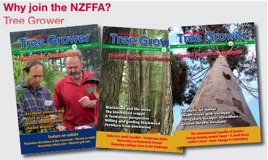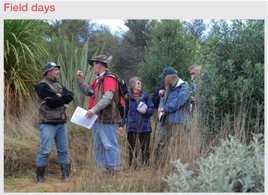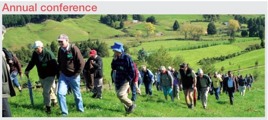What to do when that arrangement with your contractor turns sour
John Schrider, New Zealand Tree Grower February 2013.
All farm foresters reach a point in their tree growing when they must decide to cut all emotional ties they have with the woodlot they have carefully established and nurtured over the past 25 to 30 years, and call in the chainsaws. Most will use outside experts or those claiming to be experts in the form of log marketing companies or harvesting contractors who they rely on to extract maximum value for those years of hard work. Not all these arrangements will go smoothly and invariably there will be disagreements or problems that require remedial action. This article provides an insight into some of the alternatives available to resolve disputes with your contractor rather than pursue resolution through an expensive and long winded court litigation process.
Alternative dispute resolution processes are those which are available outside the process of court litigation. They continue to evolve and become more widely used as businesses and individuals look for less expensive and more timely resolution of disputes. There is no reason why these processes cannot be employed where disputes arise with your contractor. In most cases they are highly recommended.
Dispute resolution processes
Dispute resolution is a collective term for the processes of resolving disputes. Disputes of a forestry nature can generally be addressed via one of the following processes – negotiation, facilitation, mediation, arbitration, investigation or expert determination. Dispute resolution processes have the advantage of being confidential and can be tailored to suit the particular needs of the dispute and those involved.
They need not be formal and rigid where resolution via a more fluid and flexible approach is unachievable, and those who are better prepared are the more likely to have a successful conclusion. An explanation of the more common dispute resolution processes follow.
Negotiation
The simplest way for disputing parties to sort out problems is to negotiate a satisfactory solution. Negotiation is a process of communication in which parties or their representatives work to reach agreement. Negotiation may or may not settle or resolve the dispute, but it should be the first step taken towards achieving a resolution.
Facilitation
Facilitate means to make easier, or to simplify. Facilitation is a process which is similar to mediation but is more flexible. A facilitator can help to resolve a dispute by negotiation, consultation, information gathering and problem solving. A facilitator works to help in managing communication and potential conflict and preventing the escalation of a conflict. A facilitator will not provide answers but instead will ask questions and help people to reach increased understanding and find answers and make decisions for themselves.
Mediation
Mediation is a confidential and consensual dispute resolution process in which an independent and impartial mediator facilitates negotiation to help them resolve their dispute. Mediation differs significantly from arbitration and litigation in that neither the parties nor the mediator are limited by rules of evidence. The mediator is not a decision-maker, and the process is based on achieving co-operation.
The mediator helps those involved to make their own decisions and agreements. The mediator’s role is to guide the process so that the problems can be defined, the relevant information produced and options explored without undue delay or legalistic procedures. When a dispute is resolved in mediation, a written agreement is signed which sets out the results of the problems that have been resolved at the mediation.
Arbitration
Arbitration is a process for the settlement of disputes in which an independent and impartial arbitrator makes a decision to settle a dispute after considering the representations. The arbitrator’s decision is called an award and is normally final and binding. The award is written and signed by the arbitrator and enforceable by the courts. The Arbitration Act 1996 contains statutory provisions that govern the arbitration process.
Investigation
Investigation is a dispute resolution process which may be carried out in response to an allegation or complaint. An investigator works within the policies and procedures of the organisation involved. After fully investigating a complaint or allegation, an investigator submits an objective report which includes the investigators conclusions and recommendations. The investigator is not a decision-maker but provides objective information to help a decision-maker.
Expert determination
An expert is instructed to investigate and use their own expertise to determine the problems in dispute. The expert may make a determination with or without submissions from the parties involved and acts within the terms of reference set out.
Dispute resolution processes have the advantage that they can be −
- Confidential
- Informal
- Relatively quick
- Relatively inexpensive
- Flexible.
Mediator, arbitrator or expert
Where contracts provide for disputes to be referred to arbitration or mediation they usually set out how this process is to occur. The Arbitration Act 1996 sets out procedures for arbitration in the event that this is unclear. There is no similar legislation for mediation or expert determination.
Virtually anyone can be appointed as an arbitrator or mediator unless as otherwise specified in pieces of legislation, regulation or contract. It is highly recommended, however, that anyone helping in dispute resolution has a very good understanding of the legal context in which they are asked to operate.
The NZ Institute of Forestry has established an arbitration and mediation panel in conjunction with the Arbitrators and Mediators Institute of New Zealand and access to this panel is available to anyone with a forestry related dispute. The panel members have been appointed based on demonstration of appropriate skills or experience in dispute resolution and having met the requirements for admission to their panels.
Dispute resolution under contract
Jurisdiction for the resolution of disputes is often determined by a clause in the contract. The greater the care taken in establishing the contract dispute resolution clause, the less risk of the dispute becoming embroiled in prolonged arguments. It follows that absence of a contract at all, or even a contract presented by your contractor, does increase your risk of reduced control and protection should a dispute arise.
All arrangements with forestry service providers including planters, pruners, thinners and harvesters should be covered by a written contract. This written contract should have a clause which outlines a course of action to be taken in the event that disagreements emerge in the relationship. Spending that extra few hundred dollars to have your lawyer or advisor construct a suitable dispute resolution clause in that contact before work actually starts may be a very wise and cost effective investment.
Sample clause
A sample arbitration clause could be as follows.
All questions or differences which may at any time arise between the owner and the manager relating to this agreement will be referred to a single arbitrator to be appointed by the President of the New Zealand Institute of Forestry. Such arbitration is to be conducted in accordance with the provisions of the Arbitration Act 1996. This clause will be deemed to be a submission to arbitration within the meaning of the Act. Both parties agree that the decision of the arbitrator will be final and binding.
John Schrider is a director of forestry consulting company, Forme Consulting Group Limited and an Associate of the Arbitrators’ and Mediators’ Institute of New Zealand Inc.

 Farm Forestry New Zealand
Farm Forestry New Zealand

